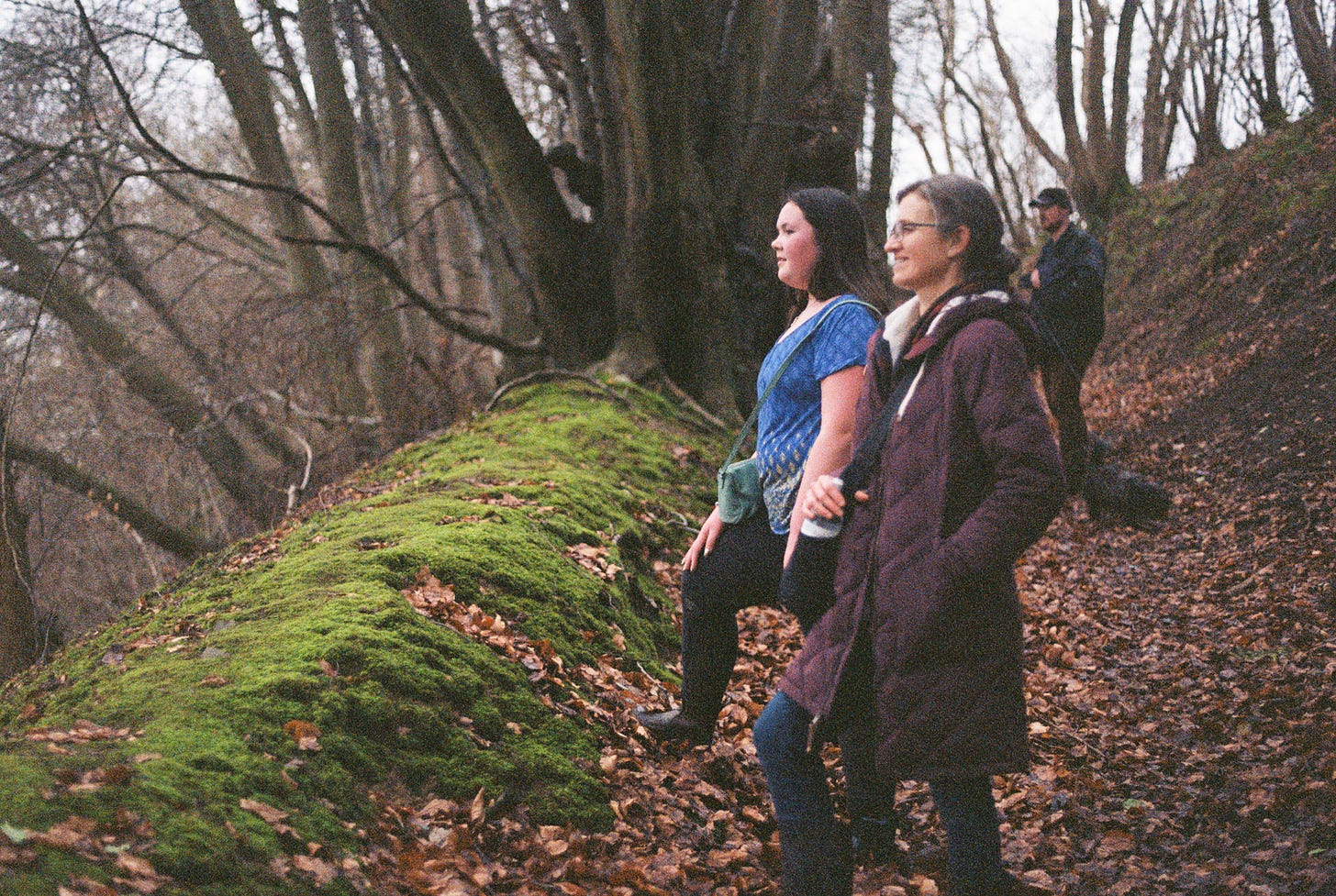In This Episode:
Tomsées is Part 3 of my short take on the role of attestation in Christianity. Part 2 was 1,600 words long, so if you got through it all, pour yourself a big ol’ glass of orange juice. This one falls under 1,000 words. 😜
What Happened? Follow-ups from two events:
Kaitlyn Scheiss, author of The Bible and the Ballot Box
Doug Serven, producer/researcher on the podcast: True Believer: The Unsolved Murder of Elizabeth Mackintosh
What’s next? A blurb on our final Forum of the ‘24-’25 season: Why Drive When You Can Walk featuring myself and two friends.
Tomsées
In which I share a short take on Christ and culture.*
Source Subject
To catch you up to speed allow me to quote my conclusion from last month:
Jesus never wrote a book, but the force of his character inspired a new genre: A Gospel. Matthew, Mark, Luke, and John each wrote one out as real time witnesses, and the apostolic family signed off. None of it was ever done in secret.
Nowhere is lockstep uniformity of practice and belief an assumed reality through the worldwide church. We differ, argue, and splinter because we essentially believe the apostolic community is a source worth wrestling over.
Even the imperfection of the practiced Faith is no object to God’s work in the world.
Is it because the Source behind all sources is a personal, living God?
Let the word count begin.
Speech-to-Text
I’m always amused by the monotone ennunciations we speak into our phones.
Please tell Jeremy that I WON’T be picking him up from soccer and that dinner might be a little late ‘cause Gran is still at the clinic grooming dogs ….
Despite our best articulation, we still have to edit our ideas with our thumbs. But at least we get to own our own mistakes. Not so with others’ statements.
Media broadcasters are the most pedantic at controlling their material:
This copyrighted broadcast of the National Basketball Association may not be re-transmitted, reproduced, rebroadcast, or otherwise distributed or used in any form without the express written consent of the NBA.1
In a similar vein, do we have the “express written consent” of God? That is, assuming God does speak, and has “in-scripturated” his ideas (as Jews as Christians have historically believed), then…
How is it that he left it up to us to translate it into our own, ever-changing languages?
Obviously this is a massive question! But there’s one overwhelming bit of evidence we all ought to consider whether or not we accept the Bible as God’s message to humanity: The ridiculous amount of biblical texts which attest to the message itself.
These manuscripts have been the darlings of Bible publishers in every language throughout history. Scholars have been wrestling them down into translations for generations, working from the ancient Hebrew and Koine Greek.2
Text-to-Speech
Any one of us can do a little online homework on these texts. The work of F.F. Bruce is also perfect place to start.3 Simply research the facts about the source materials which only have grown in number thanks to ongoing discoveries like The Dead Sea Scrolls between 1946 and 1964. According to Wikipedia:
The New Testament has been preserved in more than 5,800 Greek manuscripts, 10,000 Latin manuscripts and 9,300 manuscripts in various other ancient languages including Syriac, Slavic, Ethiopic and Armenian. Even if the original Greek versions were lost, the entire New Testament could still be assembled from the translations.4
Not only should the stratospheric quantity of NT documents stop us in our tracks, their ancient origins also speak to their potential for undergirding a reasonable faith.
From the same article we read that two of the oldest preserved manuscripts are housed in the Sackler Library Papyrology Room at the University of Oxford:
P90 (P. Oxy. 3523), is a small fragment of papyrus with portions of the Gospel of John on both sides. It has been dated paleographically to the second century A.D. and was part of a group of manuscripts discovered in a dumping ground near Oxyrhynchus, Egypt!
Papayrus P104 (P. Oxy. 4404), also from the second-century, contains Matt. 21:34-37 on the front, and parts of verses 43 and 45 on the back.
It’s stunning to compare those dates to those of Seneca the Younger’s epistles. Circulated in the First Century BCE, the oldest manuscripts we have are from the ninth-century.[2]
Get the Message
I recently finished Winn Collier’s biography of Eugene Peterson, A Burning in My Bones. You may know that Peterson’s most popular project was The Message, his rendition of the Scriptures.
When it first came out in 2003 I was well aware that he was attempting a paraphrase of the Old and New Testaments and not a strict translation. But some folks took offense to it for its failure to render the received texts “literally.”
Perhaps they favored a wooden translation deprived of normal English syntax and tidied up with word-for-word translation, something that’s not humanly possible. Besides overlooking Peterson’s sermonic purpose, they failed to recognize Eugene’s immense respect for and superior dexterity in handling the biblical languages.
Oh, and Peterson was quite well-read. His lifelong passion was to write about God and to do it well. At some point he began answering the queries of some critics by challenging them to learn the ancient languages themselves and then get back to him!
Back to my original question: Assuming God does speak, then how is it that he left it up to us to translate it into our own, ever-changing languages?
I believe that God designed it this way. The message of his grace is always wrapped in personhood. The sacred texts are the basis for the proclaimed message of his Good News. The ability to learn of Jesus, trust in him, and go to church is not dependent upon literacy.
Salvation isn’t even dependent upon us guarding the text, though thankfully, many have done so over the years. Instead salvation comes by turning from our natural bent to ignore, refuse, or refute the Good News and turning to God in personal trust.
As Paul, whose own heart was set free by an encounter with Jesus, put it:
Remember, our Message is not about ourselves, we’re proclaiming Jesus Christ, the Master. All we are is messengers, errand runners from Jesus for you. It started when God said, “Light up the darkness!” and our lives filled up with light as we saw and understood God in the face of Christ, all bright and beautiful.
-II Corinthians 4:5-6, The Message
*Tomsées is a nod to Pensées, an eclectic collection of writings by Blaise Pascal which were a work of apologetics for the Christian faith, published posthumously in 1670. If you please, you can pronounce it “Tom says.” Trying to pronounce French might cause bodily injury.
What Happened?
Aimee Clement, Virtual Assistant for The Row House, reflects on our most recent forum, and you can listen too. See link below.
True Crime: An Assessment of Truth Telling, Privacy, and Exploitation | April 11th
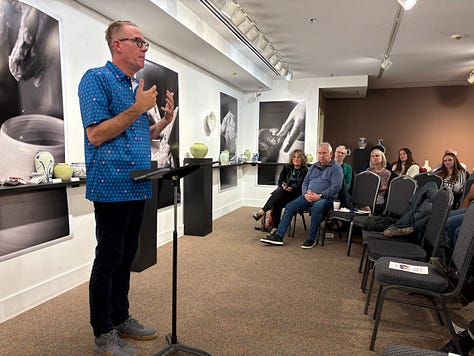
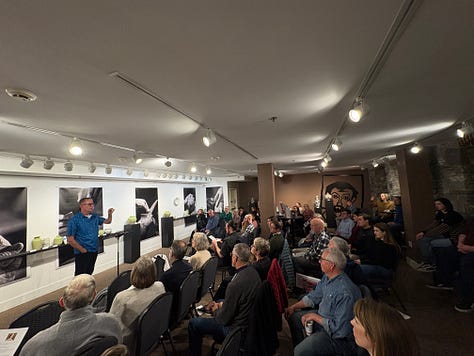
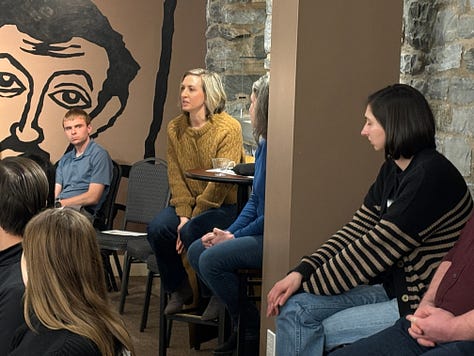
I had the chance to attend The Row House’s recent forum, True Crime: An Assessment of Truth Telling, Privacy, and Exploitation, and it left me with a lot to think about. The speaker, Doug Serven—an ordained PCA minister and pastor at Grace Church—was clearly wrestling with the weight of the topic. The forum centered on the unsolved murder of Elizabeth Mackintosh, a case Doug researched as part of the podcast True Believer. He opened the evening with a look at the 9th Commandment and how it’s interpreted in the Westminster Catechism. From the start, it was clear that Doug felt the tension between telling the truth and the moral obligation not to slander or bear false witness.
One idea that’s been rattling around in my head ever since is this: in the pursuit of truth—especially in cases of serious injustice—aren’t we sometimes required to ask hard, even painful questions? Questions that might suggest someone familiar, someone trusted, could have done something unthinkable? Is that slander or just a necessary part of discovering the truth? Doug didn’t flinch from these questions. He held the tension boldly with humor, clearly more committed to truth than to protecting his own comfort or image. His presentation didn’t wrap everything up neatly—it left space for more questions, more reflection, and more conversation. If you’re curious, I’d recommend checking out the True Believer podcast—it dives deeper into Elizabeth’s story and the difficult questions it brings to the surface. Or if you were not able to attend the forum, check out the recorded audio here.” - Aimee Clement
Podcast: True Believer: The Unsolved Murder of Elizabeth Mackintosh.
Forum Audio: Listen Here!
Next Up!
What’s Around the Corner at The Row House, Inc.
May 9 | Why Drive When You Can Walk? Tom Becker & Friends
Our final forum of the season is coming up on May 9th! This one picks up where we left off in my two-part series, Practicing Vincibility. You might recall we began by exploring the fascinating appeal yet perennial problem of automobiles.
Need a quick refresher? Click HERE to view the slides and hear me talk (at length!) about cars and all their complicated charm.

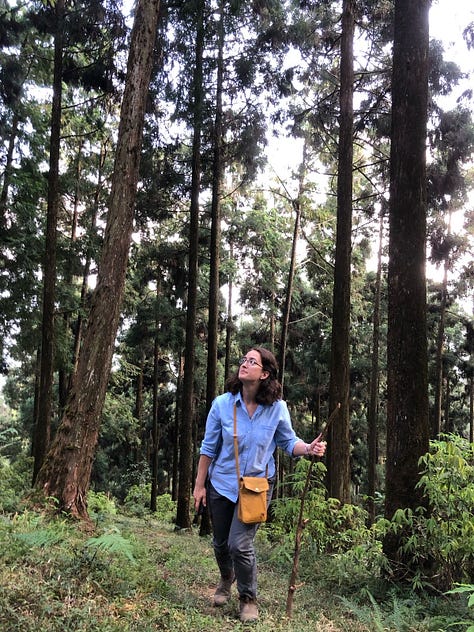

This time, I’m calling in a little help from my friends—Emily Nixon and Laura Pauls-Thomas—as we explore the deeply human (read: spiritual) benefits of walking.
Emily, a long-time presence at our Forums, will share stories and slides from her pilgrimage along the Camino de Santiago in Spain.
Laura Pauls-Thomas, a transit advocate here in Lancaster, will bring her insights on how our city is taking steps to enhance walkability.
And we’re not just talking about walking—we’re doing it. After the Forum, we’ll take a short stroll to a local pub (most likely Decades—final details coming soon). On the way, we’ll pay close attention to how the design of our streets shapes the walking experience — for better or worse.
Also, a big shout out to our May forum sponsor, Rogers & Associates!
Don’t forget to ❤️ this column, make a comment, or share this post with a friend. We thank ya!
Not used by permission of the NBA.
The Septuagint (LXX), the earliest extant Greek translation of the received Hebrew Old Testament texts, was compiled in the third century, B.C.E.
Bruce, F.F., The New Testament Documents: Are The Reliable? (Inter Varsity Press, 1943). My copy is the fifth edition from 1987.
https://en.wikipedia.org/wiki/New_Testament#cite_note-Strobel,_Lee_1998-200




